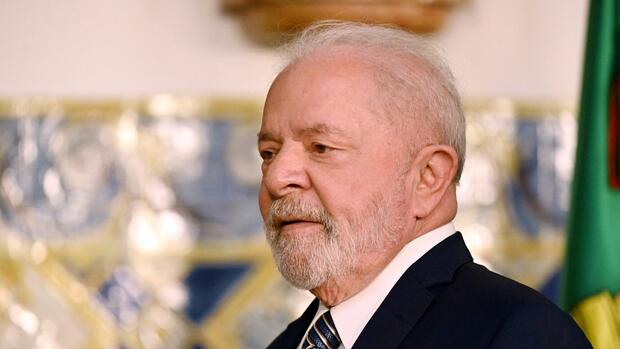Salvador For many years he was the shadow behind Brazilian President Luiz Inácio Lula da Silva. When “Lula” appeared in the crowd during his first terms in office from 2003 to 2010, the three-star general Gonçalves Dias was always close to him. As of early 2023, Dias served in Lula’s third government as Secretary of Institutional Security. But recently Dias had to resign. Video footage has surfaced that suggests he may be involved in the January 8 coup attempt against Lula.
This development is problematic for the Lula government. Because the opposition wants to install a committee of inquiry in Congress. For months, supporters of Jair Bolsonaro, the former president of Brazil, have been spreading the narrative on social media that the destruction in the government district was provoked by left-wing agents. “They now have the stage they want in Congress,” says political expert Pedro Doria. The problem is that a committee of inquiry could block Congress for months.
Lula’s finance minister, Fernando Haddad, has just tabled a bill with budget rules designed to prevent Brazil’s debt from growing any further. But now it looks like the Lula government stalled before it even began to govern properly.
The middle class and the economy increasingly feel their needs are being ignored. Polls show that 38 percent of Brazilians still think Lula is good after a hundred days in office, 30 percent are undecided. Especially when it comes to safety, health and education, Lula has no plan.
“Lula hasn’t even been in office for four months,” says the well-known political commentator Dora Kramer. “But after the initial successes, Lula’s poor decisions now outweigh the negative.” The politician is drifting further and further to the left.
Lula’s early successes
Lula was convincing when he traveled to Egypt immediately after his election for the COP 27 climate summit and announced a radical change to his predecessor in environmental policy. This made Brazil more attractive to Western governments again. Brazil previously avoided this due to the environmental policies of predecessor Bolsonaro.
The middle class and the economy increasingly feel their needs are being ignored.
(Photo: E+/Getty Images)
Lula showed tact when filling his cabinet: he chose Marina Silva, his former environment minister, as one of the key figures in his government. Sônia Guajajara is the first indigenous woman to hold office as Minister for the Affairs of the Indigenous Peoples of Brazil.
He also brought several conservative politicians into the cabinet – such as Vice President and Economics Minister Geraldo Alckmin or Planning Minister Simone Tebet. Both are former political opponents of Lula and should keep in touch with the economy and the farmers. These had largely voted for Bolsonaro in the past.
When he took office on January 1 with representatives of civil society, it looked as if Lula would now implement what he had promised during the election campaign: he wanted to govern as president for all Brazilians and unite the divided country again. These pledges were well received because Lula had won by a razor-thin majority.
Lula’s tone has changed
But things turned out differently. The trigger was the coup attempt on January 8th. Lula has become more suspicious and aggressive in tone. He is increasingly centralizing the business of government to himself. He no longer tries to unite all of Brazil. He speaks primarily to his left-wing supporters.
For months, supporters of Jair Bolsonaro have been spreading the narrative on social media that the destruction in the government district was provoked by left-wing agents.
(Photo: IMAGO/Fotoarena)
Lula regularly criticizes the central bank for its autonomy and high interest rates. He also wants to reverse laws that benefit the poor in Brazil in particular.
An example: Lula wants to change the reform of the sewage and water supply introduced after a long discussion in Congress in 2019 by decree. Public utilities are said to remain monopoly providers in communities – only to prevent private companies, which have already invested the equivalent of $15 billion in the three years since, from stepping in.
Almost 100 million Brazilians are not connected to a sewage system. But Lula’s Labor Party wants to control the sewage companies to provide their supporters with jobs. Similar steps backwards under pressure from the trade unions threaten in the education system.
>> Read here: Lula receives Lavrov – and snubs the US and Europe
The state, its corporations and banks should once again be at the center of the economy. Regarding corruption investigations, Lula recently claimed that they were directed by the US to weaken the Brazilian economy.
Shift to the left is evident in geopolitics
However, Lula’s shift to the left in geopolitics is particularly evident. Lula is now following the traditional line of his party’s foreign policy, says Rubens Ricupero, dean of Brazilian diplomacy. “He doesn’t listen to anyone else.”
Lula sees herself as a spokesman for the Global South. He wants to strengthen the Brics group of states – i.e. Brazil, Russia, India, China and South Africa – as an alternative to the G7 of industrialized countries. China is Brazil’s largest trading partner.
The procedure is problematic because Lula also wants to act as a potential mediator for peace in Ukraine. But he shows more understanding for the aggressor Russia than for the victim Ukraine. He emphasizes what he has in common with China and snubs the US and Europe. This is well received in parts of Africa, the Middle East and Latin America – whether it is for the good of Brazil remains to be seen.
>> Read here: Xi rejects China’s entry into Lula’s ‘peace club’
Barely back from China, Lula traveled to Portugal and Spain. The G7 summit in Hiroshima in May is on the agenda, as is a tour of Africa before mid-year. Sometimes it seems as if Lula, even at the beginning of his tenure, would prefer to flee abroad, where he will still be received with all honor.
More: Lula 100 days in office: German industry relies on Brazil’s comeback
